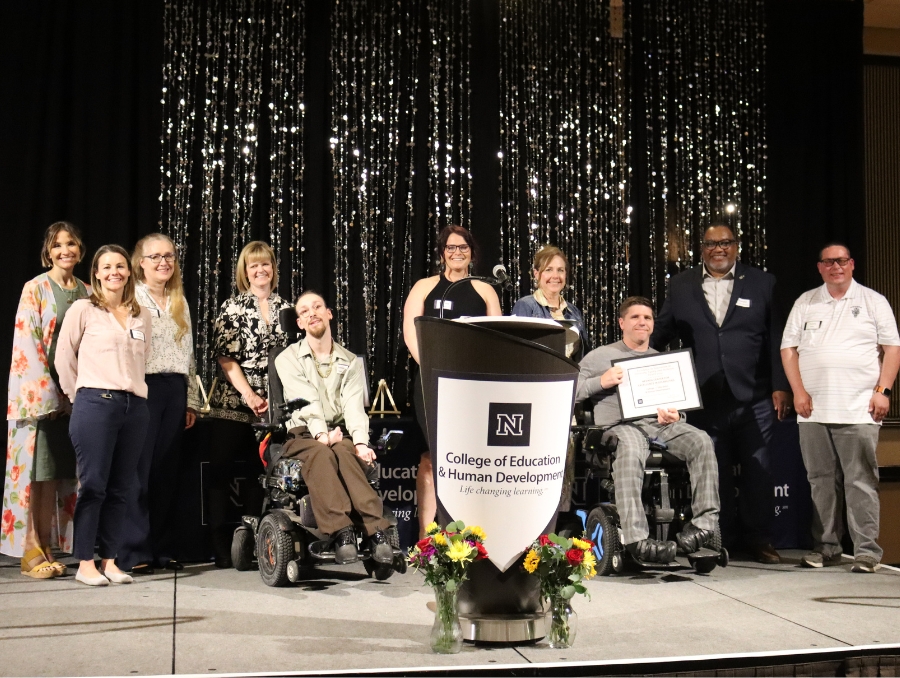With an eye toward yet another round of budget reductions, University of Nevada, Reno President Milt Glick and Provost Marc Johnson encouraged faculty and staff to remain positive and productive. Their remarks came during a town hall meeting Thursday in the grand ballroom of the Joe Crowley Student Union.
“This is not a time to despair,” Johnson said of a proposed 14 percent budget reduction for 2009-2010 due to the state’s economic downswing. “It’s a time to remember the mission that we are here to accomplish. … How can we take the budget reductions and continue to build your career … your discipline … your University.”
“Whenever you start to say there is no future,” Glick added, “then you will spiral downward overnight.”
Glick used the current U.S. News World & Report rankings of colleges and universities to further renew the notion that the University can continue to improve, even in the face of an additional $15 to $16 million that will have to be pared from the University’s budget.
Glick said that by focusing on improving its standing in the U.S. News rankings – rankings that he admitted are “the metric we all love to hate because it’s a flawed system” – will help the University in many ways.
When asked by a member of the audience about ways that the University could improve its annual ranking, Glick used his experience as provost at Arizona State University as an example, where the mantra became “retention-graduation rate/retention-graduation rate.”
“It took a decade, but yes, it was a success story (and ASU did move from Tier 3 to Tier 2, a move that Nevada would also like to make),” Glick said. “The focus was retention-graduation rate/retention-graduation rate, and it was an obsession. That’s where we need to obsess.”
Given the uncertain economic times, Glick said it was critical that the University not stand still, and continue to embrace aspirational goals.
Gains made in areas such as freshman retention and graduation rates, the number of top students admitted to the University, Glick said, “… can have a lot of impact (in the form of increased enrollment), particularly if we are allowed to keep our tuition in the future.”
The news on these fronts, based on Thursday’s town hall, is promising.
Glick said the University, for the first time, had reached the requirements of the National Merit Scholarship Program, with 17 National Merit Scholar students now enrolled over the past two years. In addition, the Honors Program welcomed 140 first-year participants this semester, bringing the program’s numbers to 500.
Good news such as this, Glick said, should be one of the reasons why faculty and staff should continue “to find ways to be as productive as we can.”
“It’s important we grow, because we are facing some tough odds right now,” Glick said.
Even with so many promising gains, Glick also made it clear that the foreseeable future will be challenging.
“I can’t look you in the eye,” he told the audience of the looming budget cuts, “and say that there will be no real damage.”
Johnson said that in his three months on campus as provost he had traveled throughout the state, from Elko in northeast Nevada to Pahrump in southern Nevada (“I can’t spell Pahrump, but I can tell you I was there,” he said, jokingly). He said he has been heartened by the campus’ commitment to shared governance, as well as the faculty’s willingness to engage in meaningful conversation regarding the budget reductions.
“I’m extremely impressed with the people I’ve met,” he said. To reinforce this idea, he referenced item No. 18 under “Values” in the University’s Mission Statement: A sense of humor. He said with a smile, “I haven’t met a soul without a good sense of humor … and we’re going to need that as we get through the next couple of years.”
Johnson said that beginning Friday and carrying into next week, the campus’ deans will receive charges to work with department chairs and program heads to determine the possibilities of where the next budget reductions could occur. Factors such as class sizes, number of majors and number of degrees granted for majors will all be included in the discussion. In addition, a review of the University’s institutes, centers and academies will also take place, in consultation with the directors of these entities.
“We will trim at the edges to protect the core,” Johnson said.
He added, “We all need to maintain at least a five-year perspective to build the best University we can. Our goal through the fall is to review lots of programs for potential state fund reductions and then implement appropriate changes throughout the spring to be ready for the new biennial budget in July.”
Glick stressed many of the goals he has put forth since assuming the University’s presidency in 2006. Most notable: that the University must continue to seek state investment, yet maintain a sense of empowerment with accountability.
“Let us have more freedom to do our job,” Glick said. “If we raise tuition, let us keep the tuition … and if we do that, we will need to have accountability.”
Other highlights of the meeting, which included a Q&A with the audience, as well as 169 faculty and staff who viewed it via the Web:
Johnson explained that a review of the functions of the Office of the Vice President for Research is underway, with the goal to maintain regulatory compliance with measurable performance goals, as well as improve customer service in some areas.
When asked about the process that occurred in late June, when the University had to announce several notices of non-renewal due to its personnel policies, Glick promised that the University would work harder to ensure that the process, if it occurs in the future, would be much more deliberate. “We’re not going to have any surprises. We will make sure that somebody will not walk in and then you receive an NNR,” he said.
Related to the NNR’s was the impact the notices had on certain areas. The Career Development Center was particularly hard-hit, and Glick acknowledged that particular service would be hard to replace. He added, though, that several colleges – though not all – have offered a similar service and would be expected to continue to pitch in. “We will be working with the deans to see how we can provide that service. I won’t tell you we will be providing it at the same level, so there will be a real loss there,” he said.
On the future of Getchell Library, Glick said he was cautiously optimistic that the State Public Works Board would agree to funding for code work beginning after July 2009 that would enable the 170,000-square-foot facility to be “adaptively reused” for the Department of Art as well as other administrative and student-based functions. He said that by bringing the building back up to code, it would save the University money at $58 per square foot versus several hundred dollars per square foot for a new building in its place.
Of projections for the University’s enrollment, Glick said he was hoping it would continue to increase, as it has for the past several years. “Enrollment is not down,” he said. “We hope it’s up a little. It won’t be down.”
When a member of the audience said that he didn’t envy Glick for the tough decisions that had been made and will be made in the next few months, Glick smiled: “To be here, creating the future with so many bright and talented people … I think I have one of the best jobs in the world.”










